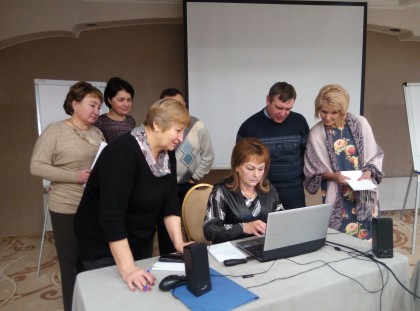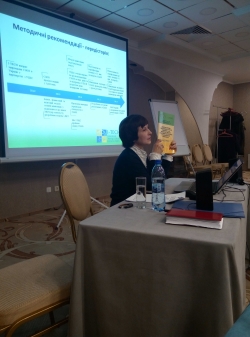
This month, the International Training and Education Center for Health (I-TECH), working with the Ministry of Health (MOH) in Ukraine, sensitized heads and other managers of HIV/AIDS clinics and centers on how to implement continuous quality improvement (CQI) by applying an approach known as the Clinical Assessment for Systems Strengthening, or ClASS, model.
The MOH’s Center of Public Health and I-TECH Ukraine held a two-day ClASS sensitization workshop for HIV clinicians from seven regions of Ukraine that are new to ClASS. The ClASS approach addresses CQI and identifies areas for improvement and assessment as well as detailed follow-up actions.
Presentation of the model was supplemented by reports and success stories shared by teams from Cherkasy, Kyiv, Chernivtsi Oblast, and Kryviy Rig City AIDS Centers, along with other sites that participated in ClASS between 2014 and 2016. The exchange of this experience proved effective in ensuring buy-in from new regions and raised their interest in and excitement about the model and its potential impact.

I-TECH Ukraine Program Director Iryna Yuryeva, who presented the ClASS model, said she was encouraged by the response to the workshop. Perceptions among the new audience shifted “amazingly quickly” she said, “from extreme concern, anxiety, and belief that almost nothing can and should be improved at their health care facilities to sincere and passionate interest and impatient anticipation of ClASS visits in the coming months.”
Participants expressed keen interest in the ClASS approach, which emphasizes team problem-solving and joint identification of ways to improve assessment, develop operational and strategic plans, and seek technical assistance when needed to address gaps. In addition, ClASS could also be helpful for health care facilities preparing for formal accreditation by addressing assessment-based practical recommendations.
The “real-life cases and improvements” reported by the participating clinicians, and their ability to exchange experiences and proactively tackle main areas for improvement, were highlights of the training. This is all part of the ClASS methodology, a process that I-TECH’s Yurveya says demonstrates a “natural and evolutionary continuous quality improvement.”
I-TECH Ukraine will continue to support the MOH by promoting the ClASS approach as part of the CQI process in Ukraine, in particular by conducting additional ClASS trainings in seven new regions in 2017.